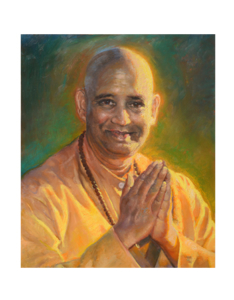Master the Senses!
An aspirant needs to control the externalized movement of the mind. There is always something to hear, something to touch, something to see, something to taste, and something to smell. Involved in sense-enjoyments, mind in the majority of people remains in an externalized state.
Just as water flows from a higher to a lower level, so too the externalized mind flows towards the objects of the world. This externalized movement is natural for the masses, but an aspirant is a hero who must turn the senses inwards, thereby allowing the mind to flow towards Brahman, or the Divine Self.
These are the causes and the cures of mental externalization:
- Lack of prana. A person who is unable to experience a balanced flow of prana within his body tends to be agitated by the senses. A yogi however, who practices pranayama and knows the art of directing the prana from one center (chakra) to another, is not inclined to be agitated by the objects of the senses.
- The presence of desires. When a person seeks happiness from objects, his mind becomes filled with desires. As long as desires rule the mind, the senses cannot be controlled because the senses follow the dictates of the mind. But by developing vairagya, or dispassion, an aspirant gains an insight into the fact that the objects of the senses are sapless and insignificant. Good association (satsanga), selfless service, and various forms of spiritual discipline are aids in mastering the senses.
- The pressure of vasanas. Even when the conscious desires are checked and the senses are under restraint, subtle desires (vasanas) continue to exist in the subconscious. A yogi changes the pattern of his vasanas by the practice of mantra repetition (japa), meditation, and spiritual inquiry.
- The error in one’s reason. Due to ignorance (avidya), the intellect in a person is unable to gain insight into the fact that the Spirit is ever free of dependence on the objects, that it is blissful, peaceful, and non-dual. This error is removed by spiritual inquiry into “Who am I?”
 When your mind flows through the senses, it assumes the forms of objects of the world. By doing so, the mind is kept in a degraded state. But when the mind flows to Brahman, it turns away from the objects and assumes the form of Brahman. This is the process of mental upliftment.
When your mind flows through the senses, it assumes the forms of objects of the world. By doing so, the mind is kept in a degraded state. But when the mind flows to Brahman, it turns away from the objects and assumes the form of Brahman. This is the process of mental upliftment.
When your thoughts are of hatred, jealousy, passion, and greed, your mind flows downward into the planes of sense-objects; when your thoughts however, are of devotion, contentment, peace, harmony, truthfulness, purity, humility, and sublimity, your mind flows upward – towards Brahman.
There are various stages in the practice of pratyahara, or withdrawal of the mind and senses from the objects of the world. A Hatha Yogi, by the practice of various pranayama exercises, attains mastery over the pranas. He allows the prana to move from one center to another, from one part of the body to another thereby replenishing his physical system with refreshing energy. Prana is the secret of psycho-physical balance. Pranayama, or control of the prana, helps a yogi to develop a healthy mind in a healthy body. Through such a psycho-physical system, the senses are then very easily controlled.
For a practitioner of Raja Yoga, success in pratyahara is achieved by gradual accent on the path of concentration and meditation. As the mind is withdrawn from various objects, prana is gradually controlled, and the mind and senses are mastered.
A Bhakti Yogi performs all actions in the spirit of worshiping the Divine Self. This is a higher form of pratyahara. The practice of constant presence of the Divine Self enables the mind to be free from the desires for objects. Surrender to God thus brings about perfection in the practice of mastering the senses.
A Jnana Yogi practices inquiry into “Who am I?” He negates the illusion of the ego center and identifies himself with the Universal Self. This effort is meant to root out the very cause of mental externalization.
Wherever your mind turns, therein try to perceive the presence of the Divine Self. Do not struggle with the mind. Learn the art of lifting the veil of name and form, and thus revealing every object to be nothing but Brahman. When the mind is restless and the senses turbulent, gain mastery by the sustained practice of abhyasa and vairagya – repeated effort and dispassion.
Blessed is the yogi who is not deluded by the illusory pleasures of the objects. Even though living in the midst of noises, such a yogi will enjoy peace and harmony within his heart.
If you are an adept in the practice of pratyahara, you can relax even when confronted with stressful situations like traveling. You can continue to think, reflect, and perform any task undistracted by external conditions. Furthermore, you will radiate strength, peace, and harmony to those around you. It is only the weak in mind who are inclined to disharmony, quarrels, misunderstandings, and bitterness. The Yogi who is full of chronic energy and inner spiritual strength, remains calm and still like a mountain in the midst of raging storms.
The higher stages of yogic practice, concentration, meditation, and samadhi, become easy and effortless for those who have attained success in pratyahara. Therefore, be a hero! With a sustained effort, attain mastery over the mind and senses.
 May the Lord bless you! Hari OM Tat Sat!
May the Lord bless you! Hari OM Tat Sat!


